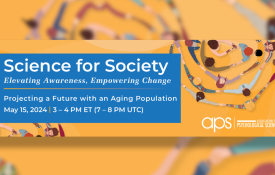-

Is Everyone Out to Get Me? Paranoia in Social Interactions
Podcast: In this episode, Under the Cortex hosts three researchers to discuss paranoia, proposed improvements for clinically testing the social impacts of paranoia, and much more.
-

How an Aging Population is Affecting Caregivers
In this May 15 webinar, three psychological researchers shared some of the latest research on the relationship between elderly patients and their caregivers, caregiver burnout, and the factors contributing to caregiver turnover at elder care facilities.
-

New Content From Perspectives on Psychological Science
A sample of articles on human chemical communication, the resilience of collectives, suspicion about suspicion probes, information avoidance, and much more.
-
Think AI Can Perceive Emotion? Think Again.
Imagine that you are interviewing for a job. The interviewer asks a question that makes you think. While concentrating, you furrow your brow and your face forms a scowl. A camera in the room feeds your scowling face to an AI model, which determines that you’ve become angry. The interview team decides not to hire you because, in their view, you are too quick to anger. Well, if you weren’t angry during the interview, you probably would be now. ...
-
Improve your sense of direction
AUTOMATED VOICE: Continue on North Calvert Street for half a mile. LIMBONG: Because without it, not only would I be lost, I'd also feel lost, and I know I'm not the only one. MARY HEGARTY: One of the things we measure in our lab is whether people feel anxious if they suddenly find themselves lost or realize they've lost track of where they are. LIMBONG: That's Mary Hegarty, a cognitive psychologist at the University of California, Santa Barbara. She leads the spatial thinking lab there, where they study how we see and interpret ourselves and other objects in space. And one of the things they study there is this thing called spatial anxiety.
-
Why writing by hand beats typing for thinking and learning
The laborious process of tracing out our thoughts, letter by letter, on the page is becoming a relic of the past in our screen-dominated world, where text messages and thumb-typed grocery lists have replaced handwritten letters and sticky notes. Electronic keyboards offer obvious efficiency benefits that have undoubtedly boosted our productivity — imagine having to write all your emails longhand. To keep up, many schools are introducing computers as early as preschool, meaning some kids may learn the basics of typing before writing by hand. ...

